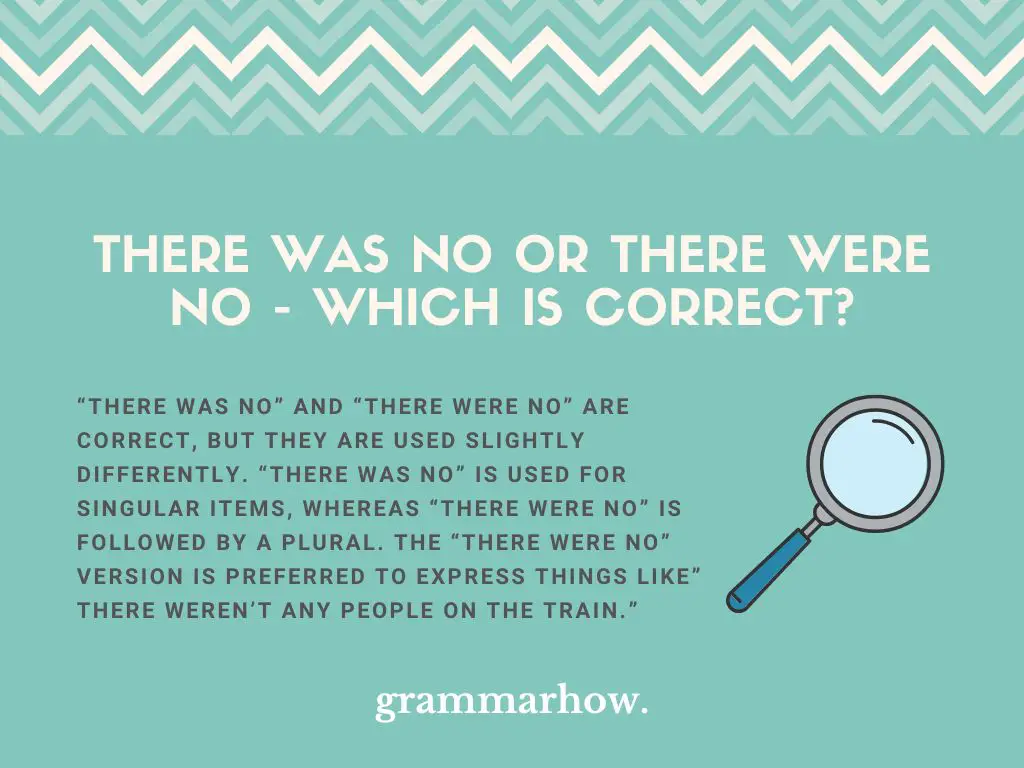The difference between “there was no” and “there were no” may look slight, however, choosing the incorrect option reduces the standard of your English. Therefore, this article examines the difference between “there was no” and “there were no” and provides contextual examples of both terms.
There Was No or There Were No – Which Is Correct?
“There was no” and “there were no” are correct, but they are used slightly differently. “There was no” is used for singular items, whereas “there were no” is followed by a plural. The “there were no” version is preferred to express things like” there weren’t any people on the train.”

For many topics of conversation, the plural version is often preferred and sounds more natural, especially for things in groups. However, “there was no” must be used for uncountable nouns.
Here are some examples of the “there were no” and “there was no” in a sentence: They have been split into two sections to show when “were” is preferred:
No difference other than singular/plural
- There was no solution to fix his problem. –
- There were no solutions to fix his problem. –
- There was no sign of remorse from the man for what he had done.
- There were no signs of remorse from the man for what he had done.
“There were no” is preferred
- There were no people at the party.
- There was no person at the party – (Sounds unnatural) – (“Not a single person” is preferred)
- There were no students on the school bus because it left early.
- There was no student on the school bus because it left early. (Sounds unnatural)
- There were no leaves on the grass because I raked them.
- There was no leaf on the grass because I raked them. (Sounds unnatural)
Uncountable nouns
- There was no furniture in the house.
- There were no furniture in the house. – INCORRECT
- There was no bread in the house.
- There were no bread in the house. – INCORRECT
Rather than “there was no” for singular countable nouns like people and students, it is preferred to say “there wasn’t a single…..”
There Was No
The term “there was no” is correct and is used with uncountable nouns and singular countable nouns and expresses the idea that “there wasn’t any” of something.
When referring to specific nouns such as people, students, and other objects that usually appear in groups, it is preferable to use the plural version “there were no people” or to use the term “there wasn’t a single….”
Here are some examples of “there was no” in a sentence:
- There was no way of getting home at that time of night other than walking.
- There was no sound of him entering the house.
- There was no answer to his question because it didn’t make sense.
- There was no money in his bank account.
- There was no fruit in the house.
There Were No
The term “there were no” is correct and is used to express “there weren’t any” of something. However, it is used with plural countable nouns and cannot be used with uncountable nouns.
As general guidance, when referring to things which generally come in large groups, it is more natural to use “there were no” rather than “there was no”, as shown in the examples below.
Examples of “there were no” in a sentence:
- There were no geese on the lake this winter.
- There was no goose on the lake this winter. – (Sounds unnatural)
- There wasn’t a single goose on the lake this winter. (Is preferable to the above version)
- There were no people in the meeting.
- There was no person in the meeting. (Sounds unnatural)
- There wasn’t a single person in the meeting. (Is preferable to the above version)
- There were no displays of courage from the competitor.
- There was no display of courage from the competitor. – CORRECT
Which Is Used the Most?
The Google Ngram shows that “there was no” has always been more frequent than “there were no”, probably because it is used for uncountable and plural nouns, whereas the latter is only for plural countable nouns.

From 1900 to 1990 “there were no” decreased steadily in use, but has since recovered to its original state. Finally, there is also very little difference between the frequency of the terms in American and British English.
Final Thoughts
The terms “there was no” and “there were no” mean the same thing, but the first is used for uncountable nouns and singular countable nouns, whilst “there were no” is used for plural countable nouns. When referring to things that come in groups, “there were no” is preferred.
